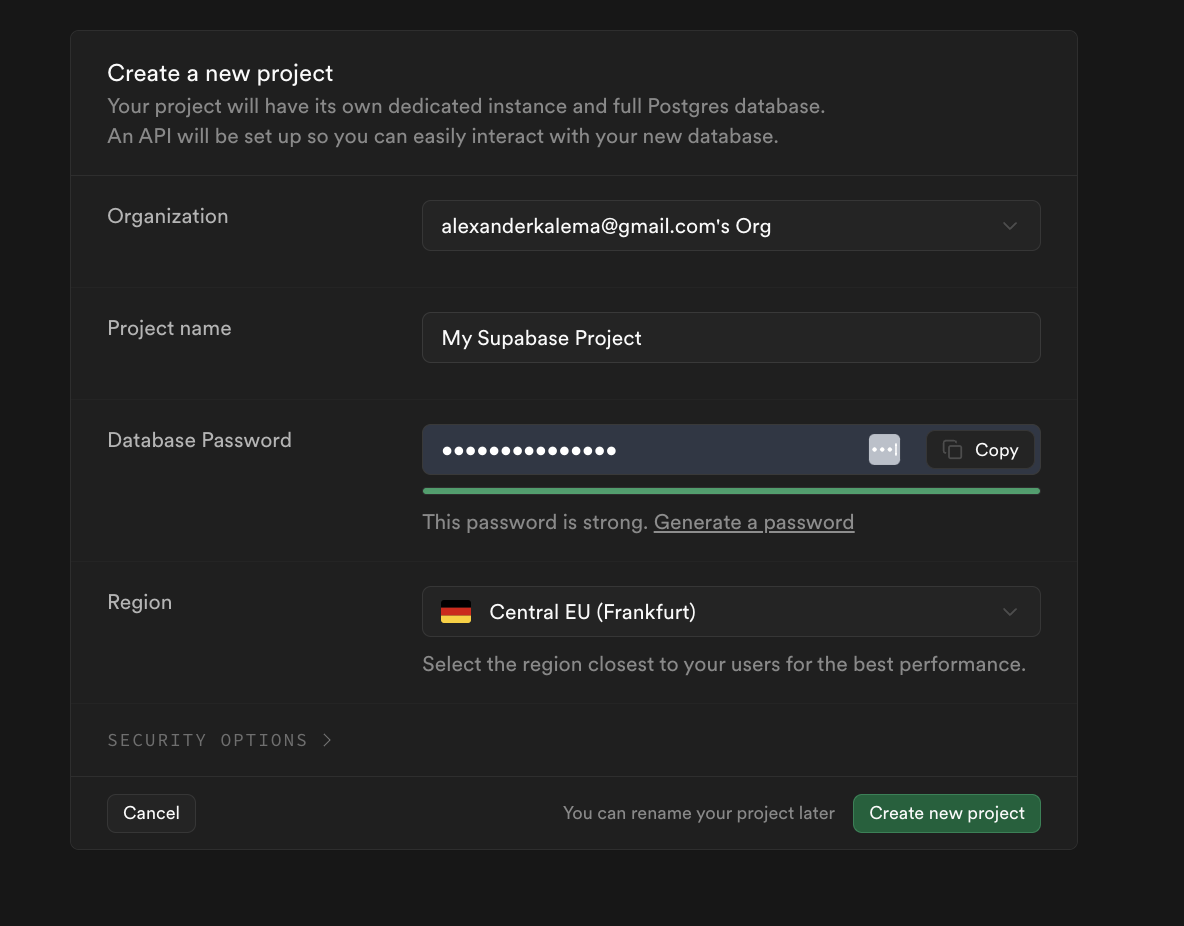How To Integrate Supabase in Flutter
Flutter has emerged as a popular framework for building cross-platform mobile applications. To enhance these applications with backend functionalities like authentication, database operations, and serverless functions, Supabase provides a robust solution. This guide will walk you through the integration process.
- ✅ Basic knowledge of Flutter and Dart
- ✅ Flutter environment set up
- ✅ Supabase account (Create one here)
Setting Up Your Supabase Project
- Create a new project in Supabase

- Locate your project credentials: (you can find these two in your supabase project dashboard)
- API URL
- Anonymous Key
Keep your project credentials secure. Never commit them directly to your source code.
Integrating Supabase in Flutter
Add the required dependencies to your project by heading to pubspec.yaml and running flutter pub get :
dependencies:
flutter:
sdk: flutter
supabase_flutter: 2.8.0
flutter_dotenv: 5.2.1
assets:
- .env
Create a .env file and setup the API URL and Anonoymus key.
SUPABASE_URL=your-url-here
SUPABASE_ANON_KEY=your-key-here
Lastly head to your main.dart and initalize your packages with these values:
import 'package:flutter/material.dart';
import 'package:flutter_dotenv/flutter_dotenv.dart';
import 'package:supabase_flutter/supabase_flutter.dart';
Future<void> main() async {
await dotenv.load(fileName: ".env");
Supabase.initialize(
url: dotenv.env['SUPABASE_URL']!,
anonKey: dotenv.env['SUPABASE_ANON_KEY']!,
);
runApp(MyApp());
}
Authentication Implementation
Supabase provides several authentication methods. Here are the most common ones:
- Sign Up
- Sign In
Future<void> signUpUser(String email, String password) async {
try {
final response = await Supabase.instance.client.auth.signUp(
email: email,
password: password,
);
} catch (error) {
// Handle error
}
}
Future<void> signInUser(String email, String password) async {
try {
final response = await Supabase.instance.client.auth.signInWithPassword(
email: email,
password: password,
);
} catch (error) {
// Handle error
}
}
Our Authentication screens would be simply setup as:
Welcome Screen - main.dart
import 'package:flutter/material.dart';
import 'package:flutter_dotenv/flutter_dotenv.dart';
import 'package:flutter_supabase/sign_in.dart';
import 'package:flutter_supabase/sign_up.dart';
import 'package:supabase_flutter/supabase_flutter.dart';
Future<void> main() async {
await dotenv.load(fileName: ".env");
Supabase.initialize(
url: dotenv.env['SUPABASE_URL']!,
anonKey: dotenv.env['SUPABASE_ANON_KEY']!,
);
runApp(MyApp());
}
class MyApp extends StatelessWidget {
const MyApp({super.key});
Widget build(BuildContext context) {
return MaterialApp(
title: 'Supabase Auth Demo',
theme: ThemeData(
colorScheme: ColorScheme.fromSeed(seedColor: Colors.deepPurple),
useMaterial3: true,
),
home: const WelcomeScreen(),
);
}
}
class WelcomeScreen extends StatelessWidget {
const WelcomeScreen({super.key});
Widget build(BuildContext context) {
return Scaffold(
body: SafeArea(
child: Padding(
padding: const EdgeInsets.symmetric(horizontal: 24.0),
child: Column(
mainAxisAlignment: MainAxisAlignment.center,
crossAxisAlignment: CrossAxisAlignment.stretch,
children: [
const Icon(
Icons.lock_outline,
size: 100,
color: Colors.deepPurple,
),
const SizedBox(height: 48),
const Text(
'Welcome to\nSupabase Auth Demo',
style: TextStyle(
fontSize: 32,
fontWeight: FontWeight.bold,
),
textAlign: TextAlign.center,
),
const SizedBox(height: 48),
ElevatedButton(
onPressed: () {
Navigator.push(
context,
MaterialPageRoute(builder: (context) => const SignInPage()),
);
},
style: ElevatedButton.styleFrom(
padding: const EdgeInsets.symmetric(vertical: 16),
backgroundColor: Colors.deepPurple,
foregroundColor: Colors.white,
),
child: const Text(
'Sign In',
style: TextStyle(fontSize: 16),
),
),
const SizedBox(height: 16),
OutlinedButton(
onPressed: () {
Navigator.push(
context,
MaterialPageRoute(builder: (context) => const SignUpPage()),
);
},
style: OutlinedButton.styleFrom(
padding: const EdgeInsets.symmetric(vertical: 16),
side: const BorderSide(color: Colors.deepPurple),
foregroundColor: Colors.deepPurple,
),
child: const Text(
'Sign Up',
style: TextStyle(fontSize: 16),
),
),
],
),
),
),
);
}
}
Sign Up Screen - sign_up.dart
import 'package:flutter/material.dart';
import 'package:flutter_supabase/home.dart';
import 'package:supabase_flutter/supabase_flutter.dart';
class SignUpPage extends StatefulWidget {
const SignUpPage({super.key});
State<SignUpPage> createState() => _SignUpPageState();
}
class _SignUpPageState extends State<SignUpPage> {
final _emailController = TextEditingController();
final _passwordController = TextEditingController();
final _formKey = GlobalKey<FormState>();
bool _isLoading = false;
Future<void> _signUp() async {
if (_formKey.currentState!.validate()) {
setState(() {
_isLoading = true;
});
try {
final response = await Supabase.instance.client.auth.signUp(
email: _emailController.text.trim(),
password: _passwordController.text.trim(),
);
if (response.user != null) {
Navigator.pushReplacement(
context,
MaterialPageRoute(builder: (context) => const HomePage()),
);
} else {
throw Exception('Sign-in failed. Please try again.');
}
} catch (error) {
ScaffoldMessenger.of(context).showSnackBar(
SnackBar(content: Text(error.toString())),
);
} finally {
setState(() {
_isLoading = false;
});
}
}
}
Widget build(BuildContext context) {
return Scaffold(
appBar: AppBar(title: const Text('Sign Up')),
body: Padding(
padding: const EdgeInsets.all(16.0),
child: Form(
key: _formKey,
child: Column(
children: [
TextFormField(
controller: _emailController,
decoration: const InputDecoration(labelText: 'Email'),
validator: (value) =>
value!.isEmpty ? 'Please enter email' : null,
),
TextFormField(
controller: _passwordController,
decoration: const InputDecoration(labelText: 'Password'),
obscureText: true,
validator: (value) =>
value!.isEmpty ? 'Please enter password' : null,
),
const SizedBox(height: 20),
ElevatedButton(
onPressed: _isLoading ? null : _signUp,
child: _isLoading
? const CircularProgressIndicator()
: const Text('Sign Up'),
),
],
),
),
),
);
}
}
Sign in Screen - sign_in.dart
import 'package:flutter/material.dart';
import 'package:flutter_supabase/home.dart';
import 'package:supabase_flutter/supabase_flutter.dart';
class SignInPage extends StatefulWidget {
const SignInPage({super.key});
State<SignInPage> createState() => _SignInPageState();
}
class _SignInPageState extends State<SignInPage> {
final _emailController = TextEditingController();
final _passwordController = TextEditingController();
final _formKey = GlobalKey<FormState>();
bool _isLoading = false;
Future<void> _signIn() async {
if (_formKey.currentState!.validate()) {
setState(() {
_isLoading = true;
});
try {
final response = await Supabase.instance.client.auth.signInWithPassword(
email: _emailController.text.trim(),
password: _passwordController.text.trim(),
);
if (response.user != null) {
Navigator.pushReplacement(
context,
MaterialPageRoute(builder: (context) => const HomePage()),
);
} else {
throw Exception('Sign-in failed. Please try again.');
}
} catch (error) {
ScaffoldMessenger.of(context).showSnackBar(
SnackBar(content: Text(error.toString())),
);
} finally {
setState(() {
_isLoading = false;
});
}
}
}
Widget build(BuildContext context) {
return Scaffold(
appBar: AppBar(title: const Text('Sign In')),
body: Padding(
padding: const EdgeInsets.all(16.0),
child: Form(
key: _formKey,
child: Column(
children: [
TextFormField(
controller: _emailController,
decoration: const InputDecoration(labelText: 'Email'),
validator: (value) =>
value!.isEmpty ? 'Please enter email' : null,
),
TextFormField(
controller: _passwordController,
decoration: const InputDecoration(labelText: 'Password'),
obscureText: true,
validator: (value) =>
value!.isEmpty ? 'Please enter password' : null,
),
const SizedBox(height: 20),
ElevatedButton(
onPressed: _isLoading ? null : _signIn,
child: _isLoading
? const CircularProgressIndicator()
: const Text('Sign In'),
),
],
),
),
),
);
}
}
Go ahead sign up . You should see your user appear under the autnetication section in your supabase.

Database Operations
Learn how to perform basic CRUD operations with Supabase:
- Create
- Read
- Update
- Delete
Future<void> addData() async {
try {
await Supabase.instance.client
.from('your_table')
.insert({
'key': 'value',
});
} catch (error) {
// handle error
}
}
Future<void> _fetchData() async {
try {
final response = await Supabase.instance.client
.from('your_table')
.select();
} catch (error) {
// handle error
} finally {
setState(() {
_isLoading = false;
});
}
}
// Update an item by its ID
Future<void> _updateItem(int id) async {
try {
await Supabase.instance.client
.from('your_table')
.update({
'key': 'new-value',
})
.eq('id', id);
} catch (error) {
//handle error
}
}
// Delete an item by its ID
Future<void> _deleteItem(int id) async {
try {
await Supabase.instance.client
.from('your_table')
.delete()
.eq('id', id);
} catch (error) {
// handle error
}
}
Home Screen - home.dart
import 'package:flutter/material.dart';
import 'package:flutter_supabase/main.dart';
import 'package:supabase_flutter/supabase_flutter.dart';
class HomePage extends StatefulWidget {
const HomePage({super.key});
State<HomePage> createState() => _HomePageState();
}
class _HomePageState extends State<HomePage> {
final _user = Supabase.instance.client.auth.currentUser;
List<Map<String, dynamic>> _data = [];
bool _isLoading = false;
void initState() {
super.initState();
_fetchData();
}
Future<void> _fetchData() async {
setState(() {
_isLoading = true;
});
try {
final response = await Supabase.instance.client
.from('items')
.select();
setState(() {
_data = (response as List<dynamic>)
.map((item) => item as Map<String, dynamic>)
.toList();
});
} catch (error) {
ScaffoldMessenger.of(context).showSnackBar(
SnackBar(content: Text(error.toString())),
);
} finally {
setState(() {
_isLoading = false;
});
}
}
Future<void> _addItem(String title, String description) async {
try {
await Supabase.instance.client
.from('items')
.insert({
'title': title,
'description': description,
'user_id': _user?.id, // Optional: associate item with user
});
// Refresh the list after adding a new item
_fetchData();
} catch (error) {
print(error.toString());
ScaffoldMessenger.of(context).showSnackBar(
SnackBar(content: Text(error.toString())),
);
}
}
Future<void> _signOut() async {
try {
await Supabase.instance.client.auth.signOut();
Navigator.of(context).pushAndRemoveUntil(
MaterialPageRoute(builder: (context) => const WelcomeScreen()),
(route) => false,
);
} catch (error) {
ScaffoldMessenger.of(context).showSnackBar(
SnackBar(content: Text(error.toString())),
);
}
}
void _showAddItemDialog() {
final _titleController = TextEditingController();
final _descriptionController = TextEditingController();
showDialog(
context: context,
builder: (context) => AlertDialog(
title: const Text('Add Item'),
content: Column(
mainAxisSize: MainAxisSize.min,
children: [
TextField(
controller: _titleController,
decoration: const InputDecoration(labelText: 'Title'),
),
TextField(
controller: _descriptionController,
decoration: const InputDecoration(labelText: 'Description'),
),
],
),
actions: [
TextButton(
onPressed: () => Navigator.pop(context),
child: const Text('Cancel'),
),
TextButton(
onPressed: () {
if (_titleController.text.isNotEmpty) {
_addItem(
_titleController.text.trim(),
_descriptionController.text.trim(),
);
Navigator.pop(context);
}
},
child: const Text('Add'),
),
],
),
);
}
Widget build(BuildContext context) {
return Scaffold(
appBar: AppBar(
title: Text('Home - ${_user?.email ?? "User"}'),
actions: [
IconButton(
icon: const Icon(Icons.logout),
onPressed: _signOut,
),
],
),
floatingActionButton: FloatingActionButton(
onPressed: _showAddItemDialog,
child: const Icon(Icons.add),
),
body: _isLoading
? const Center(child: CircularProgressIndicator())
: _data.isEmpty
? const Center(child: Text('No items found'))
: ListView.builder(
itemCount: _data.length,
itemBuilder: (context, index) {
final item = _data[index];
return Card(
margin: const EdgeInsets.symmetric(
horizontal: 8,
vertical: 4,
),
child: ListTile(
title: Text(item['title'] ?? ''),
subtitle: Text(item['description'] ?? ''),
trailing: IconButton(
icon: const Icon(Icons.delete),
onPressed: () async {
try {
await Supabase.instance.client
.from('items')
.delete()
.match({'id': item['id']});
_fetchData();
} catch (error) {
ScaffoldMessenger.of(context).showSnackBar(
SnackBar(content: Text(error.toString())),
);
}
},
),
),
);
},
),
);
}
}
Go to the SQL Editor inside your supabase and create this table by executing the below command for the home page to work.
-- Create the items table
CREATE TABLE IF NOT EXISTS items (
id UUID DEFAULT gen_random_uuid() PRIMARY KEY,
created_at TIMESTAMPTZ DEFAULT NOW(),
title TEXT NOT NULL,
description TEXT,
user_id UUID REFERENCES auth.users(id)
);
-- Set up Row Level Security (RLS)
ALTER TABLE items ENABLE ROW LEVEL SECURITY;
-- Create policies
CREATE POLICY "Users can view their own items" ON items
FOR SELECT USING (auth.uid() = user_id);
CREATE POLICY "Users can create their own items" ON items
FOR INSERT WITH CHECK (auth.uid() = user_id);
CREATE POLICY "Users can update their own items" ON items
FOR UPDATE USING (auth.uid() = user_id);
CREATE POLICY "Users can delete their own items" ON items
FOR DELETE USING (auth.uid() = user_id);
Finally you should be able to do:

Serverless Functions
Implement serverless functionality using Supabase Functions:
Future<void> callFunction() async {
try{
final response = await Supabase.instance.client
.rpc('function_name', params: {'param1': 'value'});
} catch(e){
// handle error
}
}
Remember to keep your Supabase client and dependencies updated to access the latest features and security updates.
Conclusion
Integrating Supabase with Flutter opens up a plethora of possibilities for developing feature-rich apps. By following this tutorial, you should now have a basic Flutter app integrated with Supabase for authentication, database operations, and serverless functions.
Remember to refer to the Supabase documentation for more detailed information and advanced features.